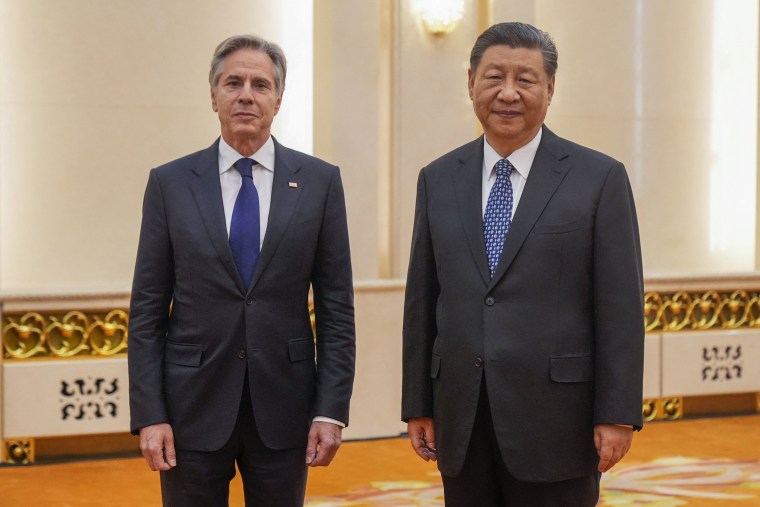Summary
- US Secretary of State Antony Blinken says he raised concerns about China's support for Russia during a meeting with President Xi Jinping
- Russia's invasion of Ukraine would "struggle" without China, Blinken tells reporters from Beijing at the end of a three-day trip
- Xi earlier told the top US diplomat that China and the US should be "partners, not rivals" and avoid engaging in "vicious competition"
China warns U.S. of ‘downward spiral’ as Blinken meets with Xi Jinping
HONG KONG — Secretary of State Antony Blinken met with Chinese President Xi Jinping in Beijing on Friday as he wrapped up a three-day visit to China dominated by contentious issues and warnings from his hosts of another “downward spiral” in relations.
The two men met Friday afternoon local time at the Great Hall of the People, an ornate and cavernous building next to Tiananmen Square.
Xi noted that this year is the 45th anniversary of the establishment of diplomatic relations between the United States and China, and said the two countries “should be partners rather than adversaries.”
“The world is big enough to accommodate the simultaneous development and prosperity of both China and the United States,” he said, according to a Chinese Foreign Ministry readout, adding that U.S.-China relations will stabilize once the U.S. takes “a positive and constructive view of China’s development.”
Speaking to reporters after the meeting, Blinken said the U.S. did not aim to hold back China’s development or decouple the world’s two largest economies.
“We want China’s economy to grow,” he said, but “the way China grows matters.”
“That means fostering a healthy economic relationship where American workers and firms are treated equally and fairly,” said Blinken, who cited what he called China’s unfair trade practices and the risk that Chinese industrial overcapacity in key industries such as solar panels and electric vehicles could result in U.S. and other markets being flooded with Chinese products.
The visit is Blinken’s second in less than a year as the two superpowers work to stabilize ties with renewed talks despite a growing list of geopolitical differences.
A primary goal of Blinken’s visit to China was to warn about its support for Russia’s war against Ukraine, which began weeks after Moscow and Beijing declared a “no limits” partnership in 2022. Though China does not appear to be supplying Russia with lethal assistance, Blinken said Friday that it was providing machine tools, microelectronics and other dual-use items that make it the “top supplier” of Russia’s defense industrial base.
“Russia would struggle to sustain its assault on Ukraine without China’s support,” he said.

Other issues on the agenda included Chinese economic and trade practices the U.S. views as unfair, Chinese aggression in the South China Sea, stability in the Taiwan Strait, North Korea’s nuclear and missile programs and the Israel-Hamas war.
Earlier Friday, Blinken met with Chinese Foreign Minister Wang Yi at the Diaoyutai State Guesthouse, where foreign dignitaries are often received.
“There’s no substitute, in our judgment, for face-to-face diplomacy in order to try and move forward, but also to make sure that we’re as clear as possible about the areas where we have differences, at the very least, to avoid misunderstandings, to avoid miscalculations,” Blinken told Wang before the meeting.
Speaking through an interpreter before the meeting, Wang said the U.S.-China relationship “has gone through ups and downs and twists and turns.”
He said the relationship was beginning to stabilize but that “negative factors” were increasing.
“China’s legitimate development rights have been unreasonably suppressed and our core interests are facing challenges,” Wang said, in an apparent reference to U.S. export controls and other measures that Beijing says are intended to limit its economic growth.
“Should China and the United States keep to the right direction of moving forward with stability or return to a downward spiral?” he said. “This is a major question before our two countries.”
Blinken later described his meeting with Wang, which lasted more than three hours, as “extensive and constructive.”
According to a State Department readout, the two men discussed next steps on a range of commitments that Xi and President Joe Biden made at their summit in California in November, including advancing cooperation on counternarcotics, military-to-military communication, talks on artificial intelligence risks and safety, and facilitating people-to-people exchanges.
Blinken announced Friday that the U.S. and China would hold their first talks on artificial intelligence in the coming weeks.
The Biden-Xi summit, the first encounter between the two leaders in a year, was intended to stabilize U.S.-China relations that had reached their lowest point in decades amid disputes over trade, technology, the status of Taiwan and the downing of a suspected Chinese spy balloon over U.S. territory.
Though ties have improved since then, they are being tested by the strengthening of U.S. security alliances in the Asia-Pacific, U.S. concerns about Chinese goods flooding global markets, U.S. inquiries into China’s electric vehicle, shipbuilding and other industries, the possibility of increased U.S. tariffs on Chinese goods, and the passage this week of legislation that could result in a U.S. ban on the Chinese app TikTok.
The legislation, which Biden signed into law on Wednesday as Blinken was arriving in China, also includes $8 billion for security in Taiwan, a self-ruling island democracy that Beijing claims as its territory, and the broader Indo-Pacific, where the U.S. and China are competing for influence.
Blinken last visited China in June, when he also met with Xi. This trip also included a stop in Shanghai, where Blinken met with U.S. business leaders and visited the Shanghai campus of New York University.


No comments:
Post a Comment